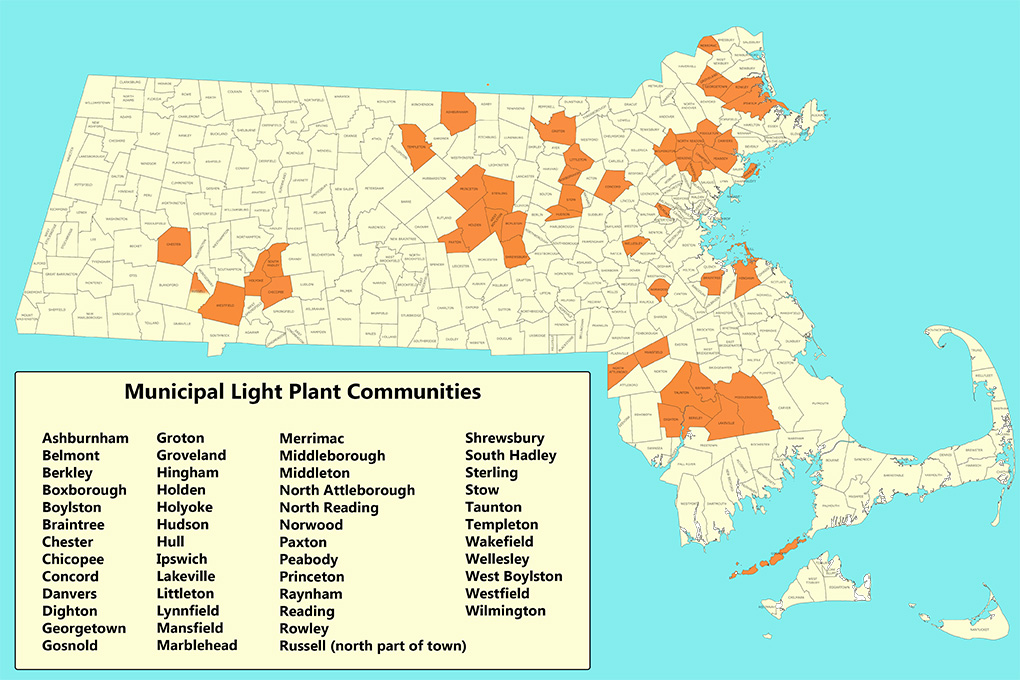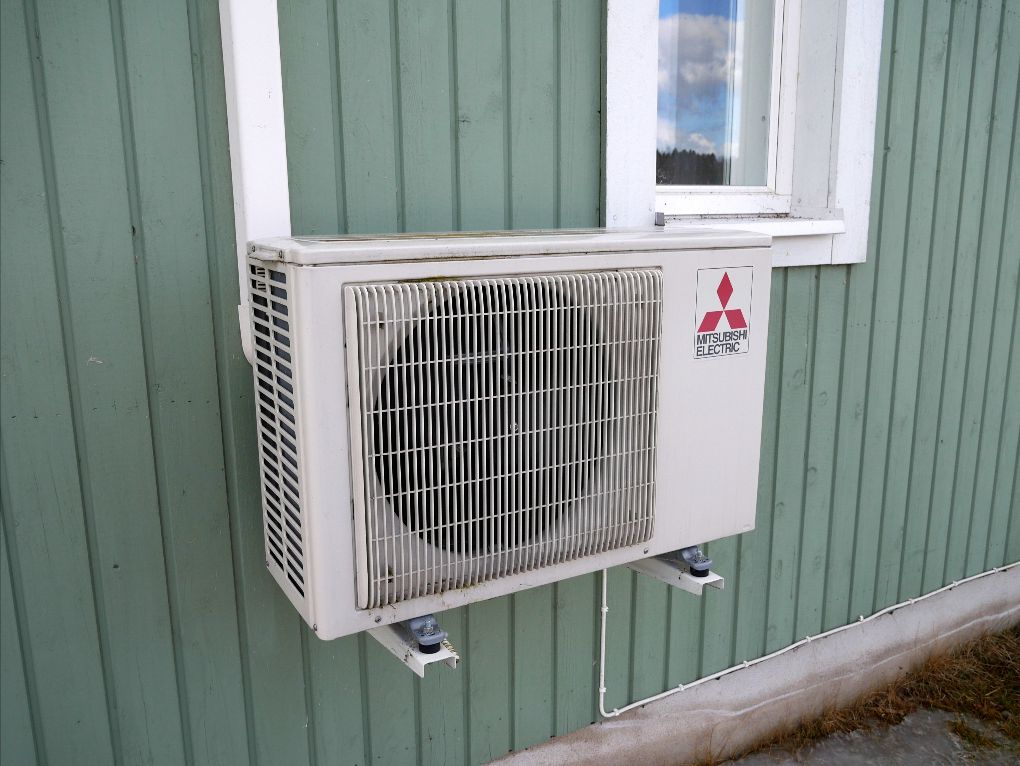Going Green: New Energy Incentives to Bridge Gap in Mass Save Programs
. Posted in News - 0 Comments
By Kimberly Rau, MassLandlords, Inc.
Incoming federal dollars will provide energy incentives to those living in communities serviced by municipal light plants, along with supplementing programs already in place through Mass Save.

There are 41 municipal light plants in Massachusetts, serving 50 communities across the state. Incoming federal funds will help residents of these municipalities make their homes more energy efficient. [Image: Derived from public color map]
The state applied for federal funds through the Inflation Reduction Act (IRA) in May 2024. Through the IRA, Massachusetts expects to receive $73 million for home efficiency rebates and $72.8 million for home electrification and appliance rebates.
The state’s Department of Energy Resources (DOER) expects to administer the funds starting in 2025 through new and existing programs. Though some of the money will go to supplement programs already offered by Mass Save, for the first time, funds will also be available for programs to support municipal light communities.
Background: Municipal Light Communities and Mass Save
Many cities and towns in Massachusetts receive their gas and light through one of the big-name utility providers such as Eversource, National Grid or Unitil. These large companies, among others, are Mass Save sponsors, also called program administrators.
Mass Save offers home energy assessments, as well as considerable rebates and other cost-saving incentives for energy retrofits and upgrades. Depending on income, customers may also access discounts or fee-free services. The programs Mass Save offers may also qualify homeowners for federal tax credits.
Eligible homeowners can save a lot of money depending on what their home needs. For example, landlords generally get whole-building insulation and air sealing 100% paid for by Mass Save.
If your municipality is one of the communities serviced by a Mass Save sponsor, then you may be eligible to participate in the energy incentives and programs offered by Mass Save.
However, not everyone lives in an area serviced by these larger providers. They receive their light and/or gas from a municipal provider, called a municipal light plant (MLP). There are 41 municipal light plant communities in Massachusetts that serve 50 municipalities. People with homes in these communities are not able to access Mass Save programs, and are limited to whatever, if any, incentives their MLP offers.
The IRA funds will allow those living in areas served by MLPs to save money on home efficiency and appliance upgrades through new and existing programs.
MLP-HER Program to Offer Rebates on Efficiency Retrofits
With federal grants it receives from the U.S. Department of Energy (DOE), the DOER will be able to offer rebates for energy efficient retrofits to both single- and multifamily properties, as long as the upgrades will reduce the home’s energy use by at least 20%.
The new Municipal Light Plant–Home Efficiency Rebates (MLP-HER) program is for residential customers in the state’s municipal light communities that are not eligible to participate in Mass Save programs. The program will be available for single- and multifamily homes (up to four units) of all income levels. While the details of the program are still being developed, MLP-HER will support home weatherization and electrification of space heating, among other measures. The DOER will administer funding for these programs.
Federal home energy rebate funds will also support the DOER’s existing Affordable Housing Decarbonization Grant Program, which helps existing affordable rental housing units with energy-efficient upgrades.
The state expects to receive $73 million in federal money for home efficiency rebates. Of that, $22 million is slated to help MLP communities through the HER program, or just over 15% of the total expected funds for both the HER and Home Electrification and Appliance Rebates programs. This number is “approximately proportional to the percentage of the Massachusetts population in MLP communities,” according to a document published by the DOER earlier this spring.
Home Electrification and Appliance Rebates to Expand Mass Save Reach
An additional $72.8 million in federal dollars from the DOE’s Home Electrification and Appliance Rebates (HEAR) program will help income-restricted residents see greater savings on energy upgrades and retrofits. These dollars will be administered through two existing Mass Save programs.
Mass Save’s income-eligible program serves single-family homes at or below 60% of the state median income, and multifamily homes at or below 60% of the area median income (AMI). The enhanced residential offers program assists households at 61–80% of the area median income with rebates and services.
“Integrating HEAR into Mass Save will lower administrative costs, allow more funding to be available to residents, enable Mass Save to serve many additional customers, and provide rebates for 100 percent of the total project cost of eligible electrification measures for households below 80 percent AMI,” stated the DOER press release.

Converting to a non-fossil fuel-based system like a heat pump can be expensive. However, incoming federal dollars may help many residents with the cost. (Image: cc-by-sa Santeri Viinamäki)
Home Energy Improvements are Costly but Necessary
We’ve written extensively about the importance of reducing carbon emissions, and with good reason. Climate change is not going away, and could have disastrous effects for everyone if efforts are not made to slow global warming.
Massachusetts has committed to a Clean Energy and Climate Plan for 2050, but that requires effort from individuals as well as larger organizations and companies.
We’ve recommended heat pumps and discussed solar energy and geothermal heating, as well as the importance of proper insulation. We’ve also covered one case study where an older home successfully received a deep energy retrofit.
But these energy-saving measures come at a high cost, and can be prohibitive for property owners. We are glad to see the state (finally!) applying for IRA funds, and even happier to learn that these funds will help communities not eligible for Mass Save incentives.
Are you a landlord in a municipal light community who plans to take advantage of these new programs in 2025? Email us as hello@masslandlords.net and let us know your thoughts.




